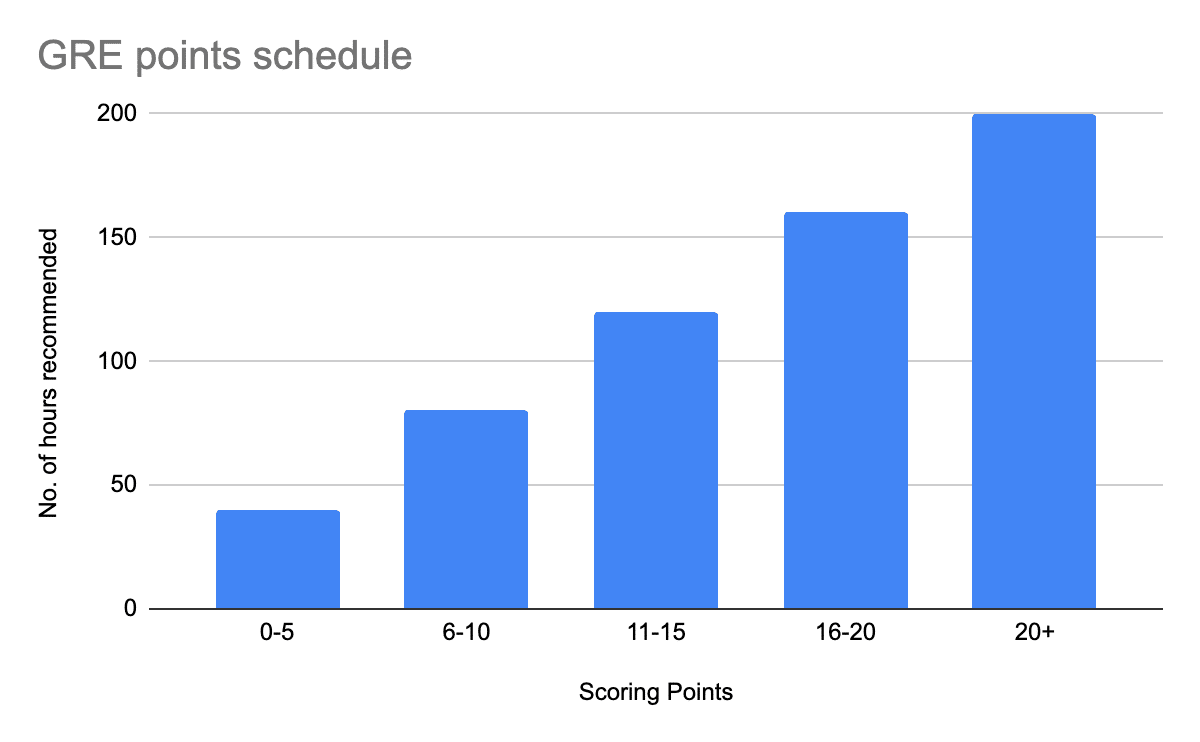Facing the GRE and thinking to yourself, how long do I study for the GRE?
Even if you are preparing for a first-class performance or you want to get to the program minimum, the study preparation time you select will affect your results.
To study efficiently, use timed practice tests, review mistakes, and apply methods like spaced repetition and active recall.
As test day comes, simulate full exams under real conditions to ensure readiness.
In this article, we will help you evaluate and customize your GRE study schedule based on the time you have available, the level of performance you want to achieve, and your starting point.
How Long do Students Usually Study for GRE?
One of the most frequent questions that potential graduate students ask is How long should I study for the GRE?
Of course, the number of hours will vary: it depends on how much you want to improve and your starting point, not to mention the hours to study.
Typically, students prepare for anywhere from 1 to 3 months,dedicating between 100 and 200 total study hours.
From my experience in test preparation, a 5-10 point range in the standard improvement commonly requires anywhere from 40 to 80 hours of prep.
For starters, you can download our 1-month study plan, which is specifically designed for candidates with limited time to prepare.
This timeline is best for motivated self-studiers or those aiming for a quick score boost.

You can take this chart as a reference to analyse how long it will require according to your aimed points
The best schedule is one that comes as a result of optimally balancing between consistency and realistic goals.
Taking your diagnostic test early, setting your clock, and preparing in advance are what matter the most.
After all, GRE rewards Participation, not procrastination.
What Affects Your GRE Study Timeline?
There are various factors that affect the quality and potential of the candidate, and to overcome this, the candidate must know their potential and fully use it to secure good marks.
Below are the 4 major factors that thoroughly affect the GRE study timeline:
- The gap between your baseline score and your target score.
- Academic background and test-taking skills.
- Daily schedule and lifestyle.
- The quality of your study resources and methods.
| Timeline | Ideal For | Weekly Hours | Total Prep Time | Pros | Cons |
|---|---|---|---|---|---|
| 1 Month | Retakers, strong baseline | 20–30 hrs | 80–120 hrs | Fast, focused | High stress |
| 3 Months | Most students | 10–15 hrs | 100–150 hrs | Balanced pace | Requires consistency |
| 6 Months | Busy schedules, deep prep | 5–8 hrs | 120–200 hrs | Flexible, low pressure | Long commitment |
In short, your GRE study timeline should be personalised, based on your goals, strengths, weaknesses, and availability, to be truly effective.
Create Your Complete Study Plan
Creating a study plan is a very crucial and easy process. To align with the exam goals, you are first required to create a roadmap so that a single minute is not wasted.
The steps below can help you create your own study plan:
- Take a Diagnostic Test: It will give you clarity as to where you stand.
- Research Target Scores: It will give you the time to adjust your requirements and study accordingly.
- Calculate Your Score Gap and Study Hours: Use the 40-hour per 5-point rule to calculate your study hours.
- Design Your Weekly Schedule: After calculating your requirements, create a study plan
Check Out the GRE Trends for 2025
Keeping in mind the competitive level of the exam and focusing on skill and tech-driven questions, the Educational Testing Service (ETS) decided to set trends where the candidate can effectively pass the examination
Here are some of the major trends mentioned that will help you to set and refine your goals.
| Trend Area | What’s Changed | Why it Matters |
|---|---|---|
| Test Duration | 1h 58m, shorter sections | Less fatigue, faster pacing, and each question counts |
| Section Structure | Removal of one essay + experimental section | Simpler format, fewer questions |
| Scoring & Percentile Shift | Percentiles shifted downward over recent years | Need higher raw scores for the same relative rank |
| Question Weight | Each question has more impact due to fewer total | Accuracy becomes more critical |
| Prep Technology | AI-powered adaptive content & analytics dashboards | Smarter, personalized prep paths |
| Market of Prep | Rise of low-cost/free options vs premium tutoring | More choices, quality vs affordability trade-offs |
| Content Emphasis | Critical thinking & data interpretation over vocab tests | Aligned with real grad school skills |
Conclusion
Therefore, there is no universal answer to how long you should study for the GRE; it depends on your goals, schedule, and starting point.
Even if you’re preparing for over 1 month or 6, Consistent Effort, Smart Strategies, and Targeted Practice are key for cracking any competitive exam.
By focusing on quality study hours, tracking your progress, and adjusting your plan as needed, you can maximize your GRE score without burnout.












